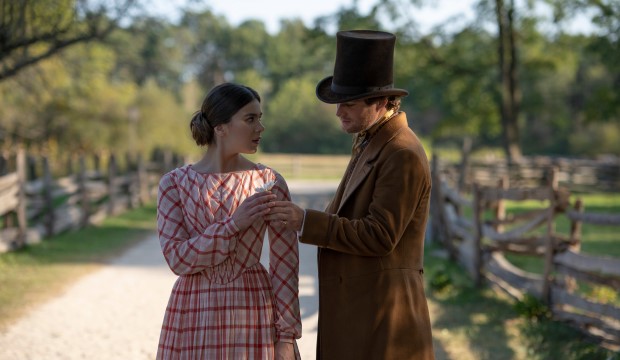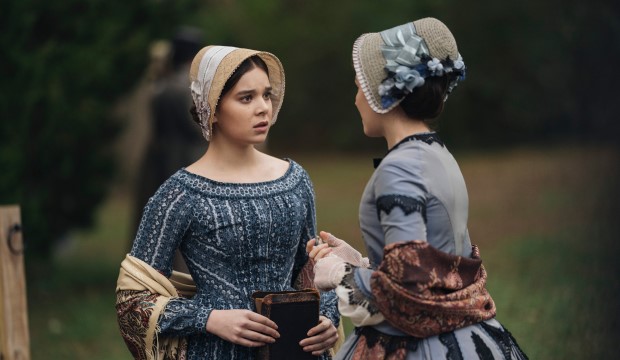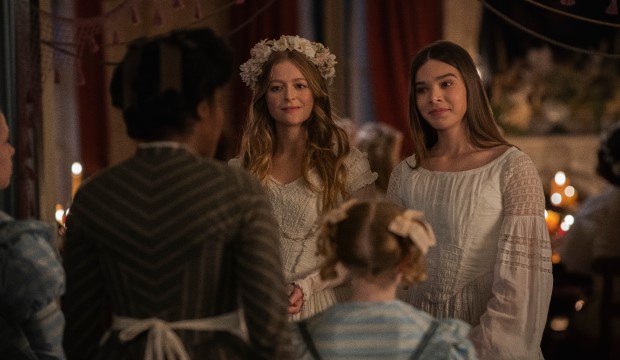Dickinson, season 2, Apple TV+ review ★★★★★
In season 2, Emily Dickinson (Hailee Steinfeld) is approaching fame as a poet after the newspaper mogul Samuel Bowles (Finn Jones) comes to town. But does she really want it?
Hailee Steinfeld in Dickinson season 2, AppleTV+
Episodes watched: 10 of 10
Season one of Dickinson, one of the first series on Apple TV+, was something of an erudite guilty pleasure: a period comedy with the poet Emily Dickinson at the centre, railing against marriage and patriarchy while speaking in Gen-Z language and dancing to Lizzo.
The modern and antiquated mould together, and it can be quite jarring – perhaps putting off viewers who prefer the polite, aristocratic dialogue usually seen in costume dramas. It was dazzling fun nonetheless, despite its imbalances and embellishments. But with season two, writer/creator Alena Smith shakes away the guilt, crosses out the weaknesses, and creates an ecstatically superior return.

Photo: Apple
After Emily (Hailee Steinfeld) reveals her calling for poetry, her patriarchal father Edward (Toby Huss) takes it rather well. Season two shows a warmer side to him, no longer functioning as an oppressive obstacle but one half of a hilarious duo with Mrs Dickinson (Jane Krakowski). The next step for Emily is professional publishing with potential fame on the horizon.
Enter the newspaper mogul Samuel Bowles – suavely, charmingly, deceptively played by Finn Jones (Game of Thrones, Iron Fist) – who publishes female writers. He bears a small resemblance to Leo DiCaprio in Django Unchained (nowhere near as cruel), as he arrogantly breaks his sentences into pithy lines like ‘You’re interesting. I’m interested.’
Introduced by Emily’s ex-lover and sister-in-law Sue (Ella Hunt), who’s become a 19th-century ‘influencer’, Sam is Emily’s ticket to wider acknowledgement. But does she really want it? She’s followed around by a mysterious personification of the Nobody from Poem 288 (‘I’m Nobody! Who are you? / Are you – Nobody – Too?’) – enacting a seemingly impossible decision between fame and introversion.

Photo: Apple
This season is more selective in the surrealism that pervades Emily’s life. It’s tied to emotional truth, which is often where the abstract works best: the bizarre as a cracked mirror reflecting indescribable, human feelings.
Steinfeld beautifully channels that confused, outspoken personality. She’s an underrated, sparky presence on screen: proficiently hilarious in cracking feminist quips while also penetrating Emily’s distress and heartbreak. We can’t reveal spoilers here, but the latter half of the season examines this in absorbing detail – wrapped in such confluent feelings that it’s hard to cope without crying yourself (or maybe it’s just this romantic critic). Smith also begins examining the intense anxiety into which the real poet descended; a dose of reality that creeps into your heart.

Photo: Apple
The times are also a-changing, as the American Civil War approaches. The possibility of war floats over the community, especially the Black citizens. There’s currently debate about casting people of colour in period dramas that don't acknowledge the racial history, but Dickinson wisely aligns Black characters with the true events of the day.
The racism in the series doesn’t reach beyond allusions to threat and slavery. It's mostly contained in the family servant Henry (Chinaza Uche), who holds anti-slavery meetings in the Dickinsons' barn. Despite the story mostly following white characters, this still feels like a significant step.
This season may not sway the Dickinson-haters out there, but it’s a vast improvement. Modern phrases swirl energetically into the vernacular like ‘Emerson is Cancelled’, ‘good vibes’ and ‘bro-hang’ – mixing with the music of MisterWives, Teenage Head and Leonard Cohen. But this time-bending union feels more significant in season two: it's given a greater purpose, a more poetic reason to exist.
Like Poem 690, Smith amusingly shows the similarities between our time and theirs: exhaling and dissolving into each other with ecstatic absurdity. An utter joy to watch.
Dickinson season 2 is available from Friday 8 January on Apple TV+
Season one of Dickinson, one of the first series on Apple TV+, was something of an erudite guilty pleasure: a period comedy with the poet Emily Dickinson at the centre, railing against marriage and patriarchy while speaking in Gen-Z language and dancing to Lizzo.
The modern and antiquated mould together, and it can be quite jarring – perhaps putting off viewers who prefer the polite, aristocratic dialogue usually seen in costume dramas. It was dazzling fun nonetheless, despite its imbalances and embellishments. But with season two, writer/creator Alena Smith shakes away the guilt, crosses out the weaknesses, and creates an ecstatically superior return.

Photo: Apple
After Emily (Hailee Steinfeld) reveals her calling for poetry, her patriarchal father Edward (Toby Huss) takes it rather well. Season two shows a warmer side to him, no longer functioning as an oppressive obstacle but one half of a hilarious duo with Mrs Dickinson (Jane Krakowski). The next step for Emily is professional publishing with potential fame on the horizon.
Enter the newspaper mogul Samuel Bowles – suavely, charmingly, deceptively played by Finn Jones (Game of Thrones, Iron Fist) – who publishes female writers. He bears a small resemblance to Leo DiCaprio in Django Unchained (nowhere near as cruel), as he arrogantly breaks his sentences into pithy lines like ‘You’re interesting. I’m interested.’
Introduced by Emily’s ex-lover and sister-in-law Sue (Ella Hunt), who’s become a 19th-century ‘influencer’, Sam is Emily’s ticket to wider acknowledgement. But does she really want it? She’s followed around by a mysterious personification of the Nobody from Poem 288 (‘I’m Nobody! Who are you? / Are you – Nobody – Too?’) – enacting a seemingly impossible decision between fame and introversion.

Photo: Apple
This season is more selective in the surrealism that pervades Emily’s life. It’s tied to emotional truth, which is often where the abstract works best: the bizarre as a cracked mirror reflecting indescribable, human feelings.
Steinfeld beautifully channels that confused, outspoken personality. She’s an underrated, sparky presence on screen: proficiently hilarious in cracking feminist quips while also penetrating Emily’s distress and heartbreak. We can’t reveal spoilers here, but the latter half of the season examines this in absorbing detail – wrapped in such confluent feelings that it’s hard to cope without crying yourself (or maybe it’s just this romantic critic). Smith also begins examining the intense anxiety into which the real poet descended; a dose of reality that creeps into your heart.

Photo: Apple
The times are also a-changing, as the American Civil War approaches. The possibility of war floats over the community, especially the Black citizens. There’s currently debate about casting people of colour in period dramas that don't acknowledge the racial history, but Dickinson wisely aligns Black characters with the true events of the day.
The racism in the series doesn’t reach beyond allusions to threat and slavery. It's mostly contained in the family servant Henry (Chinaza Uche), who holds anti-slavery meetings in the Dickinsons' barn. Despite the story mostly following white characters, this still feels like a significant step.
This season may not sway the Dickinson-haters out there, but it’s a vast improvement. Modern phrases swirl energetically into the vernacular like ‘Emerson is Cancelled’, ‘good vibes’ and ‘bro-hang’ – mixing with the music of MisterWives, Teenage Head and Leonard Cohen. But this time-bending union feels more significant in season two: it's given a greater purpose, a more poetic reason to exist.
Like Poem 690, Smith amusingly shows the similarities between our time and theirs: exhaling and dissolving into each other with ecstatic absurdity. An utter joy to watch.
Dickinson season 2 is available from Friday 8 January on Apple TV+
TRY CULTURE WHISPER
Receive free tickets & insider tips to unlock the best of London — direct to your inbox
| What | Dickinson, season 2, Apple TV+ review |
| When |
08 Jan 21 – 08 Jan 22, ON APPLE TV+ |
| Price | £n/a |
| Website | Click here for more information |